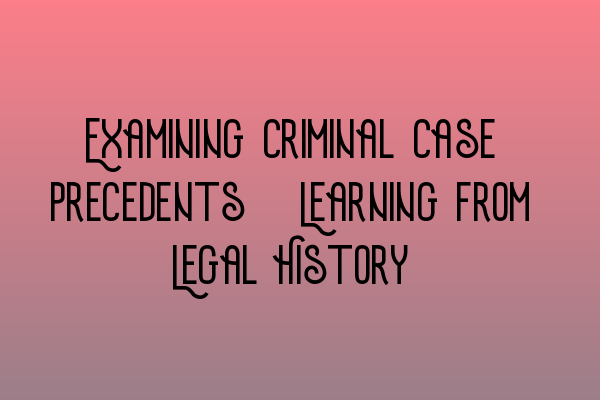Examining Criminal Case Precedents: Learning from Legal History
As solicitors at SQE Criminal Law & Practice Law UK, we understand the significance of studying criminal case precedents to enrich our legal knowledge and provide effective representation to our clients. The understanding and analysis of historical cases play a crucial role in shaping the present legal system and its practices.
Why Study Criminal Case Precedents?
Criminal case precedents serve as a valuable resource for legal professionals to navigate the complexities of criminal law and advocate for their clients effectively. By examining past cases, solicitors can gain insights into the arguments, strategies, and reasoning employed by the courts. This knowledge enables solicitors to craft persuasive arguments and anticipate potential challenges in their own cases.
Studying criminal case precedents also allows us to understand the evolution of legal principles and how they have been interpreted and applied over time. By examining the decisions made by higher courts, we can track the development of legal doctrines and identify any shifts in judicial interpretations. This knowledge helps us stay up-to-date with the latest legal trends and ensures that we provide our clients with the most relevant and effective advice.
The Role of Legal History in Practice
Legal history provides us with a rich tapestry of knowledge that informs our day-to-day practice as solicitors. It allows us to draw upon the wisdom of past legal minds and understand the reasoning behind landmark decisions. By integrating legal history into our practice, we can analyze complex scenarios, anticipate potential outcomes, and provide strategic advice to our clients.
Furthermore, legal history teaches us lessons about the pitfalls and successes of past cases. It offers us an opportunity to learn from the mistakes of others and avoid repeating them. It also helps us identify effective legal arguments and strategies that have been successful in similar cases. By leveraging this historical knowledge, we can better advocate for our clients and achieve favorable outcomes.
Integrating Legal History into Legal Education
Legal education plays a crucial role in shaping the future generation of legal professionals. By incorporating the study of legal history into the curriculum, aspiring solicitors can develop a deep understanding of the foundations of the legal system and its principles. This knowledge equips them with the necessary tools to analyze and interpret cases effectively.
At SQE Criminal Law & Practice Law UK, we understand the importance of a comprehensive legal education. That’s why we offer SQE 1 and SQE 2 preparation courses designed to provide aspiring solicitors with a well-rounded education that encompasses legal history, case analysis, and practical skills. Our courses integrate interactive learning methods, including mock exams and practice questions, to ensure a thorough understanding of the material.
If you are preparing for the SQE exams, we highly recommend our SQE 1 practice exam questions and SQE 1 practice mocks FLK1 FLK2 to enhance your knowledge and test your understanding. Additionally, our SQE 2 preparation courses are designed to equip you with the practical skills necessary for a successful legal career.
Stay updated with the latest SRA SQE exam dates by regularly checking our page on SRA SQE Exam Dates. It’s essential to remain aware of the examination schedule and plan your preparation accordingly.
Conclusion
Examining criminal case precedents and learning from legal history are integral components of our practice at SQE Criminal Law & Practice Law UK. By understanding past cases, we can develop a strong foundation of legal knowledge and provide effective representation to our clients. We encourage all aspiring solicitors to embrace the study of legal history and utilize it as a powerful tool in their legal education and practice.
